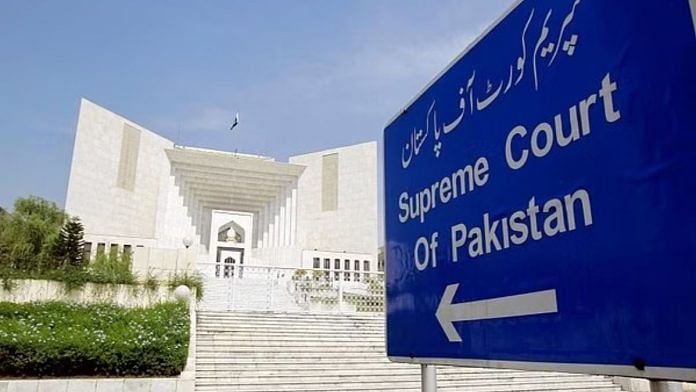New Delhi: Death of democracy in Pakistan. Conscience of turncoats. The Pakistan coalition government’s passing of the 26th Constitutional Amendment Bill has been met by anger and dismay among political opponents and the country’s legal community.
The amendment, which has been criticised for clipping the powers of the judiciary, was passed in the wee hours of Monday morning after the Shabaz Sharif government worked “overtime” during the weekend. The national daily Dawn condemned the manner in which the changes took place.
“The responsibility of building a consensus remained with the government, and if achieving buy-in from all parties meant taking a few more days or even weeks, the option should have been exhausted. Instead, the government bound itself to an arbitrary deadline, seemingly to pre-empt the upcoming change of guard at the apex court”, the paper said in its editorial.
The Constitutional Package, as it came to be called, was introduced as a Bill in September. What followed was weeks of discussions, deliberations, and debate, but it failed to get a consensus in parliament.
The final version of the Bill, which parliament endorsed, included 22 amendments—fewer than half of over 50 provisions initially proposed. The amendments essentially give the executive more power over the judiciary and limit the term of the Chief Justice of Pakistan (CJP) to three years. It also shifts the process of judicial appointments to a more politically influenced system with a parliamentary committee now responsible for the selection.
The amendment, passed by both the Senate and the National Assembly with a two-thirds majority, aims to end the Supreme Court’s ability to act on its own volition and also empower the prime minister to appoint the CJP from among the top three senior judges, a shift from the traditional seniority-based system. The Pakistan Tehreek-e-Insaf (PTI), despite acknowledging that the revised bill was less draconian than earlier versions, boycotted the voting process.
“These constitutional amendments will help put a stop to the palace conspiracies aimed at destabilising governments and removing prime ministers. This is a new dawn for Pakistan,” Prime Minister Shehbaz Sharif told parliament.
Also read: Pakistan’s 26th Constitutional Amendment bill has sparked a political storm. What it proposes
‘Democracy is dead in Pakistan’
The Pakistani media has been critical of the government’s hasty action. ‘Judiciary’s wings clipped’ was the Express Tribune’s terse headline.
In an opinion piece for The Friday Times, economist and former head of Citigroup, Yousuf Nazar, also warned that it undermined judicial independence.
“Pakistan is a dysfunctional and unstable state… We don’t have an ideal situation but judicialisation of politics cannot contribute towards solving Pakistan’s multiple crises. It has, in fact, exacerbated them. The battle for political power is best fought through the political process, no matter how highly flawed it might be,” he wrote.
Political analysts see the amendments as a reflection of a broader struggle within Pakistan’s political system, where the balance of power between the judiciary and the executive has long been a bone of contention. Most newspapers in the country came down heavily on the changes.
“It’s a black day for democracy, rule of Law and Judiciary in Pakistan. The 26th amendment is a blatant interference in the independence of the Judiciary… through this amendment, the government has routed its whims in the formation of benches. This is a violation of principles of natural justice, propriety, and fairness,” Faisal Chaudhry, Supreme Court lawyer and part of Imran Khan’s legal team, told ThePrint from Islamabad.
Lawyer Mirza Moiz Beg warned that the amendments would give the government undue influence over the judiciary, allowing it to select judges who align with its interests.
“Imagine the justice that will be meted out after a constitutional amendment for judicial “reform” that is pushed through coercion, abduction, torture, blackmail, threats, & manipulation. Democracy is dead in Pakistan,” digital rights activist Usama Khilji wrote on X.
(Edited by Ratan Priya)






